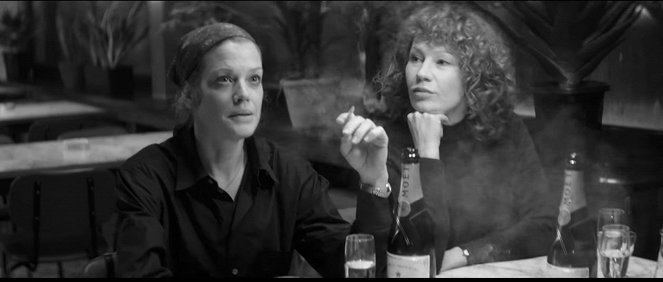Directed by:
Emily AtefScreenplay:
Emily AtefCinematography:
Thomas W. KiennastCast:
Marie Bäumer, Birgit Minichmayr, Charly Hübner, Robert Gwisdek, Denis Lavant, Yann Grouhel, Christopher Buchholz, Vicky Krieps, Jean-Louis Coullo'ch (more)Plots(1)
Robert Lebeck’s photographs of Romy Schneider are world-famous. They capture this actress’s contradictory nature, her exuberance, melancholy and pain. Lebeck also took the photographs that were to accompany the legendary interview Romy Schneider granted ‘Stern’ magazine reporter Michael Jürgs in Quiberon in 1981 – in spite of her previous negative encounters with the German press. The actress had retired to this Breton spa town to recuperate with Hilde, her close friend of many years, keeping her company. The interview and black-and-white photos form the basis of this film that captures the special atmosphere of these three days in which Schneider bares her soul – to breaking point. The more the actress exposes herself and allows the person behind the celebrity to come to the fore, the more the group dynamics of the quartet kick in. Hilde is desperate to protect her friend from herself as she begins to break down the cynical reporter’s reserve with her disarming honesty. In his photo sessions, Lebeck rediscovers Romy Schneider’s many different faces. A multi-faceted portrait emerges of a compelling actress and woman who unsparingly gives her all and yet believes she has seldom truly been seen or understood. (Berlinale)
(more)Videos (3)
Reviews (3)
3 problems with Quiberon. Two I'm willing to forgive, the third I'm not. 1 – while the illusion of frozen time always looks good in black and white, it loses points due to the obviously digital image with minimal black but lots of grey. Not to mention the post-production blurring. 2 – I was incredibly annoyed at several points by the extras, who must have been told "3-2-1... now everyone light up your cigarettes, let's go!" The result is that all the extras have a fresh cigarette in their hand at all times, yet the rooms lack the grainy haze that much smoke would have created. So there you go. These are the visual details I've decided to tolerate, thanks in large part to the acting of Maria Bäumer, whose transitions from states of unbearable self-pity to manic euphoria are amazing, and the film's most powerful moments come when the actress's practiced smile suddenly shines through all that foggy consciousness, returning now and then as if it were the only echo of times past. Why the film ultimately failed to stand up in my mind is due to the ending, which comes with cheap, commercial redemption, simple truths, and a motivational catchphrase at the end, however such a comforting conclusion to Romy Schneider's career is completely incongruous with how she gradually faded and the series of real-life tragedies that ultimately brought her fate to a close.
()
It's been almost 10 years since Torsten C. Fischer's biography Romy, starring Jessica Schwarz. Today we have Maria Bäumer as Romy in an intimate episode from the end of her life. The previous biopic focused on the 1960s, while this time it's about capturing the atmosphere of the early 1980s. No one has yet had the courage to take on the German-Austrian miracle of the 1950s, nor the French 1970s, the more traditional high points of the Schneider phenomenon's career. So be it. The contemporary trend of biographies avoids large periods of time as much as possible, fashion dictates spending only a few days with a star, because a week is too long after all. 3 Days in Quiberon is thus more about the media and the relationships between the star (in this case, Romy in the days before The Passerby), the people in the private sector (in this case, her childhood friend Hilde Fritsch), journalists (Michael Jürgs gets an immortal portrait here) and photographers (Romy's old friend Robert Lebeck). An intimate drama with a range of emotions in an enclosed space is, after all, a popular format. So why aren't the emotions working? The portrait of the mature Romy is perfectly fine, the arrogance towards Sissi's generation is ridiculous and the ignorance of her mother Magda Schneider's career is more awkward than anything else. But today's trend loves to tell the story in a nutshell without complex reasoning, because too much data, information, and opinion could be detrimental. That's why the resulting film is so successful, the festivals are applauding, and some might even be excited about the black-and-white aesthetic. #DasFilmFest
()
Even though you don't know (like me) about the tragic recent years of Romy Schneider before the screening, next to nothing, so director Emily Atef thrives with a peculiarly sad emotional dry mood, where lethargic depression alternates with tremors of activity, and the atmosphere of the inevitable approaching end, to evoke them in an unprecedented captivating way. Which is even more fascinating because she succeeds in the limited space of a few hotel spaces, without portraying or even mentioning any of the tragic events.
()



Ads